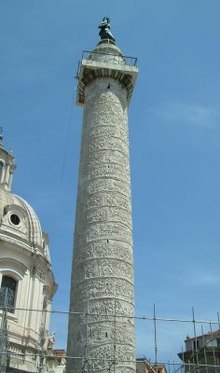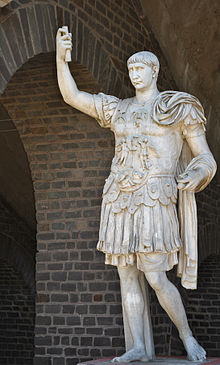Main article: Trajan's Dacian Wars
Trajan's Column, Rome
In May of 101, Trajan launched his first campaign into the Dacian kingdom,[111] crossing to the northern bank of the Danube and defeating the Dacian army at Tapae (see Second Battle of Tapae), near the Iron Gates of Transylvania. It was not a decisive victory, however.[112] Trajan's troops were mauled in the encounter, and he put off further campaigning for the year in order to regroup and reinforce his army.[113]
The following winter, King Decebalus took the initiative by launching a counter-attack across the Danube further downstream, supported by Sarmatian cavalry,[114] forcing Trajan to come to the aid of the troops in his rearguard. The Dacians and their allies were repulsed after two battles in Moesia, at Nicopolis ad Istrum and Adamclisi.[115] Trajan's army then advanced further into Dacian territory, and, a year later, forced Decebalus to submit. He had to renounce claim to some regions of his kingdom, return all Roman runaways (most of them technical experts), and surrender all his war machines.[116]
Trajan returned to Rome in triumph and was granted the title Dacicus.[117]
The peace of 102 had returned Decebalus to the condition of more or less harmless client king; however, he soon began to rearm, to again harbor Roman runaways, and to pressure his Western neighbors, the Iazyges Sarmatians, into allying themselves with him. By trying to develop an anti-Roman bloc, Decebalus eventually left Trajan without the alternative of treating Dacia as a protectorate, rather than an outright conquest.[118] In 104 Decebalus devised a failed attempt on Trajan's life by means of some Roman deserters, and held prisoner Trajan's legate Longinus, who eventually poisoned himself while in custody. Finally, in 105, Decebalus undertook an invasion of Roman-occupied territory north of the Danube.[119][120]
Prior to the campaign, Trajan had raised two entirely new legions: II Traiana – which, however, may have been posted in the East, at the Syrian port of Laodicea – and XXX Ulpia Victrix, which was posted to Brigetio, in Pannonia.[119][121] By 105, the concentration of Roman troops assembled in the middle and lower Danube amounted to fourteen legions (up from nine in 101) – about half of the entire Roman army.[122] Even after the Dacian wars, the Danube frontier would permanently replace the Rhine as the main military axis of the Roman Empire.[123] Including auxiliaries, the number of Roman troops engaged on both campaigns was between 150,000 and 175,000, while Decebalus could dispose of up to 200,000.[112]
Following the design of Apollodorus of Damascus, Trajan ordered the building of a massive bridge over the Danube, over which the Roman army was able to cross the river swiftly and in numbers, as well as to send in reinforcements, even in winter when the river was not frozen enough to bear the passage of a party of soldiers.[124] Trajan also reformed the infrastructure of the Iron Gates region of the Danube. He commissioned either the creation or enlargement of the road along the Iron Gates, carved into the side of the gorge.[125] Additionally, Trajan commissioned a canal to be built around the rapids of the Iron Gates. Evidence of this comes from a marble slab discovered near Caput Bovis, the site of a Roman fort. The slab, dated to the year 101, commemorates the building of at least one canal that went from the Kasajna tributary to at least Ducis Pratum, whose embankments were still visible until recently. However, the placement of the slab at Caput Bovis suggests that the canal extended to this point or that there was a second canal downriver of the Kasajna-Ducis Pratum one.[126]
Statue of Trajan, posing in military garb, in front of the Amphitheater of Colonia Ulpia Traiana in the Xanten Archaeological Park
Trajan built a new city, Colonia Ulpia Traiana Augusta Dacica Sarmizegetusa, on another site (north of the hill citadel holding the previous Dacian capital)[131] although bearing the same full name, Sarmizegetusa. This capital city was conceived as a purely civilian administrative center and was provided the usual Romanized administrative apparatus (decurions, aediles, etc.).[132] Urban life in Roman Dacia seems to have been restricted to Roman colonists, mostly military veterans;[133] there is no extant evidence for the existence in the province of peregrine cities. Native Dacians continued to live in scattered rural settlements, according to their own ways.[134] In another arrangement with no parallels in any other Roman province, the existing quasi-urban Dacian settlements disappeared after the Roman conquest.[135] A number of unorganized urban settlements (vici) developed around military encampments in Dacia proper - the most important being Apulum - but were only acknowledged as cities proper well after Trajan's reign.[136]
The main regional effort of urbanization was concentrated by Trajan at the rearguard, in Moesia, where he created the new cities of Nicopolis ad Istrum and Marcianopolis. A vicus was also created around the Tropaeum Traianum.[137] The garrison city of Oescus received the status of Roman colony after its legionary garrison was redeployed.[137] The fact that these former Danubian outposts had ceased to be frontier basis and were now in the deep rear acted as an inducement to their urbanization and development.[138]
Not all of Dacia was permanently occupied. What was permanently included in the province, after the post-Trajanic evacuation of some land across the lower Danube,[139] were the lands extending from the Danube to the inner arch of the Carpathian Mountains, including Transylvania, the Metaliferi Mountains and Oltenia.The Roman province eventually took the form of an "excrescence" North of the Danube, with ill-defined limits, stretching from the Danube northwards to the Carpathians,[123] and was intended perhaps as a basis for further expansion in Eastern Europe – which the Romans conceived to be much more "flattened", and closer to the ocean, than it actually was.[140] Defense of the province was entrusted to a single legion, the XIII Gemina, stationed at Apulum, which functioned as an advanced guard that could, in case of need, strike either west or east at the Sarmatians living at the borders.[138] Therefore, the indefensible character of the province did not appear to be a problem for Trajan, as the province was conceived more as a sally-base for further attacks.[141] Even in the absence of further Roman expansion, the value of the province depended on Roman overall strength: while Rome was strong, the Dacian salient was an instrument of military and diplomatic control over the Danubian lands; when Rome was weak, as during the Crisis of the Third Century, the province became a liability and was eventually abandoned.[142]
Trajan resettled Dacia with Romans and annexed it as a province of the Roman Empire. Aside from their enormous booty (over half a million slaves, according to John Lydus),[143] Trajan's Dacian campaigns benefited the Empire's finances through the acquisition of Dacia's gold mines, managed by an imperial procurator of equestrian rank (procurator aurariarum).[144] On the other hand, commercial agricultural exploitation on the villa model, based on the centralized management of a huge landed estate by a single owner (fundus) was poorly developed.[145] Therefore, use of slave labor in the province itself seems to have been relatively undeveloped, and epigraphic evidence points to work in the gold mines being conducted by means of labor contracts (locatio conductio rei) and seasonal wage-earning.[146]
The victory was commemorated by the construction both of the 102 cenotaph generally known as the Tropaeum Traiani in Moesia, as well of the much later (113) Trajan's Column in Rome, the latter depicting in stone carved bas-reliefs the Dacian Wars' most important moments.[147]


No comments:
Post a Comment